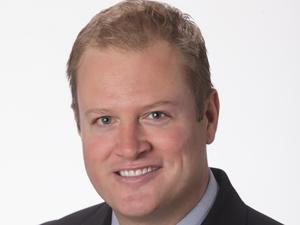
A conversation during a Fourth of July barbecue forged a new biopharmaceutical company that wants to be the next market leader.
“I want to be the next Eli Lilly,” Cingulate Inc. CEO and co-founder Shane Schaffer said. “I want to build the next pharma company here in Kansas City. … I know it can be done. Mr. K (Ewing Kauffman) did it. We have a lot of talent here, and somewhat selfishly, this is where I want to live.”
Last year, Cingulate (Nasdaq: CING) went public after a $25 million IPO. The 16-person company, based in Kansas City, Kansas, developed an innovative precision-timed release (PTR) drug-delivery platform that could be game-changing for patients dealing with conditions such as ADHD and anxiety.
“It’s the first of its kind in the world,” Schaffer said.
Its benefits and overall potential are multifaceted, including enabling patients to take one pill a day instead of multiple. Clinical trials for ADHD treatment showed a nearly 30% reduction in side effects compared with traditional drug-delivery methods.
KC roots and a serendipitous cookout
Schaffer became acquainted with Kansas City while earning a pharmacy degree from the University of Kansas. While at KU, he worked at Kansas City-based Marion Laboratories, founded by Ewing Kauffman, a philanthropist and visionary who also invested $7 million to establish the Kansas City Royals and founded the Ewing Marion Kauffman Foundation to promote education and entrepreneurship.
“Mr. K was an idol of mine, and I read his book, ‘Prescription for Success,’ every year,” Schaffer said. “It just grounds me. It reminds of his entrepreneurship and what he meant to Kansas City.”
Schaffer relocated Cingulate to Kansas in 2014, a year after its founding in New Jersey. The company's roots are tied to a Fourth of July barbecue, where Schaffer and a group of friends in the pharmaceutical industry started talking about ADHD treatment.
“We were lamenting the fact that there still wasn’t a great ADHD medication available,” he said. “These drugs had to be taken multiple times a day, and they didn’t have the best side effect profiles.”
Plus, patients typically also must take a “booster dose,” a fast-acting version of the same stimulant, not long before the regular medication is expected to wear off. The booster dose aims to alleviate crash symptoms, such as agitation, irritability, fatigue and sadness. The booster doses, however, can be abused, he said.
“You don’t abuse an extended-release product,” Schaffer said. “But if you have an Adderall, you can crack it, crush it, share it and snort it. … We wanted to fix all of those problems and do it within one delivery system — one product the patient can take. … The No. 1 thing we want to improve is patient outcomes.”
How it works
Cingulate’s PTR tablet can combine multiple doses of the same or different drugs that are released at the right intervals, at the right ratios and with the right delivery methods, which can reduce side effects.
When the medication wears off, it’s also a much smoother, controlled descent, and there’s no need for a booster dose. ADHD patients can benefit from 14 to 16 hours of active day coverage.
Taking one daily dose instead of multiple tablets offers convenience and can lead to better patient compliance rates and medical cost savings, Schaffer said.
In its phase 3 clinical trials, which start in the next several weeks, Cingulate aims to further demonstrate its PTR system’s ability to improve safety, efficacy and tolerability. The trials will include a larger number of participants and will last about a year. Cingulate then will submit to the Food and Drug Administration a new application, which the company expects will receive commercialization approval. The ADHD drug market alone is an $18 billion annual category, he said.
Beyond ADHD, Cingulate sees opportunity to use its PTR technology to treat anxiety, insomnia, bipolar disorders, cardiovascular disorders ... the list continues. Eventually, Cingulate wants to start developing new drugs.
“At the end of the day, I’m still a pharmacist, and I want to help patients out,” he said. “We’re spending a lot of money and not getting the right outcomes. It bothers me because it’s wrong, especially if there’s a way to fix this. And there is. …
“The fact that we can come in and simply fix these problems that have been around for decades and do it in a cost-effective as well as clinically effective way is something I’m really proud of.”
And Schaffer wants to continue doing it all from Kansas City: “We want to build a long-lasting future here.”






